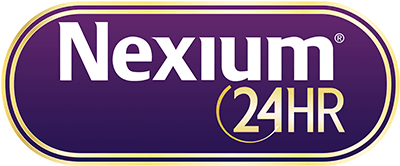PHYSIOLOGICAL CAUSES
Heartburn occurs when stomach acid rises into your esophagus. Normally when you swallow, your lower esophageal sphincter (LES) relaxes, allowing liquid to flow into your stomach, before closing again.
1. Esophagus
The muscular tube that connects the mouth and throat to the stomach.
2. Lower Esophageal Sphincter (LES)
A circular band of muscles around the bottom part of your esophagus.
3. Stomach
An internal organ in which some food digestion occurs.
4. Proton Pump
An enzyme that produces acid inside the cells that line the stomach.
5. Diaphragm
A muscle that separates the chest from the abdomen.
MYTHS ABOUT HEARTBURN
Get your facts straight on these common heartburn myths.
Everyone has the same heartburn triggers.
Triggers differ from person to person. It all comes down to how your body reacts to certain foods, other medications you may be taking, your lifestyle, weight, pregnancy, and medical conditions.
You can only get heartburn from eating certain foods.
Triggers differ from person to person. For some people, foods may be that trigger. But for others, the root cause may be physiological or environmental. If you think a certain food may be a trigger, keep tabs on what you eat and drink so you can learn how to avoid the things that trigger heartburn in your body.
If you have bad breath, it means you have acid reflux.
Bad breath is one indicator of acid reflux, but it’s not usually the only symptom. Other heartburn symptoms will likely include an uncomfortable burning sensation in your chest or throat.
Nexium® 24HR actually controls my acid reflux better than any other product that I have tried!
-Fishindt
